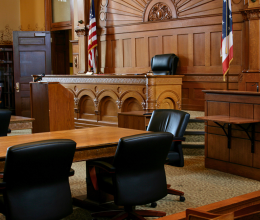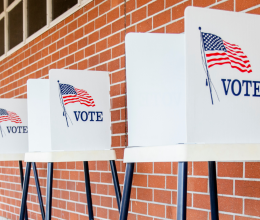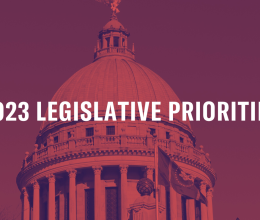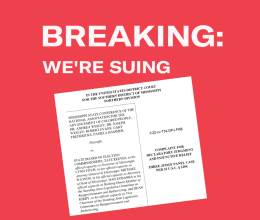With a global pandemic raging through Mississippi, the expectation was a legislative session of non-controversial bills. But not even business closures, job loss, loss of life, and disproportionate health outcomes for black and brown people could deter some lawmakers from their mission to oppress, disenfranchise, and even enslave the people of our state.
Even with the number of controversial bills coming out of committees in both chambers, we had a very successful 2021 legislative session.
This session we were able to kill three voter-purging bills – one aimed at immigrant voters and the others at infrequent voters. With the surge of voter suppression bills across the country, this is a huge victory for Mississippi. This success does not mean that we can afford to rest in our fight against voter suppression. Lawmakers who are vigilant in their efforts to preserve the footprints of Jim Crow election laws have introduced voter suppression bills every year. Until they rest from their mission, we must continue to remain vigilant in ours.
For some of our lawmakers, taking Mississippi back to Jim Crow was not far enough. Unbelievably egregious but true, our legislators sought to take us back to slavery, sharecropping, and convict leasing. Instead of placing greater energy and efforts on much needed parole and habitual sentencing reforms, our lawmakers introduced criminal justice bills ranging from creating new felony crimes to leasing incarcerated persons and taking their wages.
The ACLU of Mississippi fought long and hard against these racist and oppressive bills, and our work paid off. As a result, we were able to:
Kill bills that would have disenfranchised Black and Immigrant voters
- HB 586 would have required a comparison between data in the state’s elections management system and an unknown system to “ensure non-United States citizens are not registered to vote.”
- HB 4 and SB 2588 would have purged voters from the rolls if they chose not to vote.
Kill bills that would have created new felony offenses
- SB 2279 would have created a new felony punishable by 5 years imprisonment for persons who missed probation appointments. SB 2279 would have potentially impacted 9,000 people currently on parole and over 500 people currently on early release with no public safety gains.
- HB 83 created a vaguely defined new felony offense targeted at peaceful protesting, punishable by up to three years in prison and a $5,000 fine. In addition to criminal penalties, the bill would have stripped unemployment assistance to those found guilty and would have allowed drivers and business owners to murder protestors without liability. The bill would have further subjected organizations like the ACLU of Mississippi to liability.
Amended a bill that would have created statewide convict leasing, modern-day slavery and sharecropping
- The original version of House Bill 747 would have literally and formally revived Mississippi’s late 1800’s Leasing Law that forced incarcerated persons into unpaid forced labor for private and state industry. Allowing sheriffs and judges to work in collaboration to sentence incarcerated persons to work for private companies and turn over all of their earned wages, HB 747 was ripe for abuse. HB 747 would have incentivized mass incarceration, and exacerbated and expanded Mississippi’s current problem with free inmate labor and debtors’ prisons carried out through the Joint County-State Work Programs and the State’s four restitution centers.
- As a result of our aggressive advocacy, supporters of HB 747 requested meetings to explain why the bill was not an attempt to resurrect convict leasing, slavery, and sharecropping. Holding firm to our opposition of the bill, we reached a compromise that allows the Sheriff of Rankin County to implement a one-year pilot program. The bill limits the pilot program to no more than 25 incarcerated persons, requires incarcerated persons to open a bank account, and caps the amount of wages used to pay child support, fines and restitution. In addition to mandatory reporting by Sheriff Bailey, the PEER Committee will conduct a final study of the pilot program.
Secure dignity for incarcerated women
- HB 196 prohibits the practice of using restraints on incarcerated pregnant women and during childbirth, provides counseling and services tailored to the needs of pregnant women, permits more time for a mother to spend with her newborn child, expands visitation rights of mothers and children, and provides certain feminine hygiene products and pampers.
With all these wins, there were a few setbacks that the ACLU of Mississippi will continue to address:
- Mississippi’s legislators were determined to pass an anti-transgender student-athlete bill targeted at children by prohibiting transgender girls from participating in girls’ sports. ACLU Mississippi will monitor implementation of this law and continue to provide space for transgender individuals to tell their stories and counter attempts at dehumanizing their existence.
- Even with both chambers passing bills to address Mississippi’s dangerously high prison population, Mississippi will not see any habitual sentencing reform, and limited parole reform. While we believed these bills were off to a good start, the parole bill (SB 2795) was the only one to survive. Habitual sentencing reform died when lawmakers could not agree on the terms of probation for persons serving habitual sentences – leaving people languishing in prison for no valid reason. While SB 2795 will extend eligibility for parole hearings to some otherwise ineligible incarcerated persons, SB 2795 places more restrictions on crimes for which Black people are incarcerated at higher rates – potentially disproportionately impacting up to 62% of Black incarcerated persons.
- Lawmakers also fell short of passing legislation to require transparency through a uniform reporting standard for jail census data by county sheriff’s departments. ACLU Mississippi drafted a clean bill based on a Study Committee report ordered by the legislature last year. Although the bill faced push back from several sheriffs, we were able to work with the Mississippi Sheriffs’ Association to reach a compromise that would not overly burden sheriffs’ departments, and still provide advocates, courts, and family member of incarcerated persons with the data needed to effectively advocate for bail reform and further accomplish the goals set out in the committee report. Despite these efforts and the fact that the Study Committee members unanimously agreed that this level of transparency and uniformity is needed, SB 2573 died in conference at the hands of one conferee determined to see the bill die.
While the legislative session has concluded, our commitment to defending and expanding civil liberties and freedoms for all Mississippians continues. As such, ACLU Mississippi will build upon our successes and continue to advocate for change through policy, grassroots organizing and litigation.






